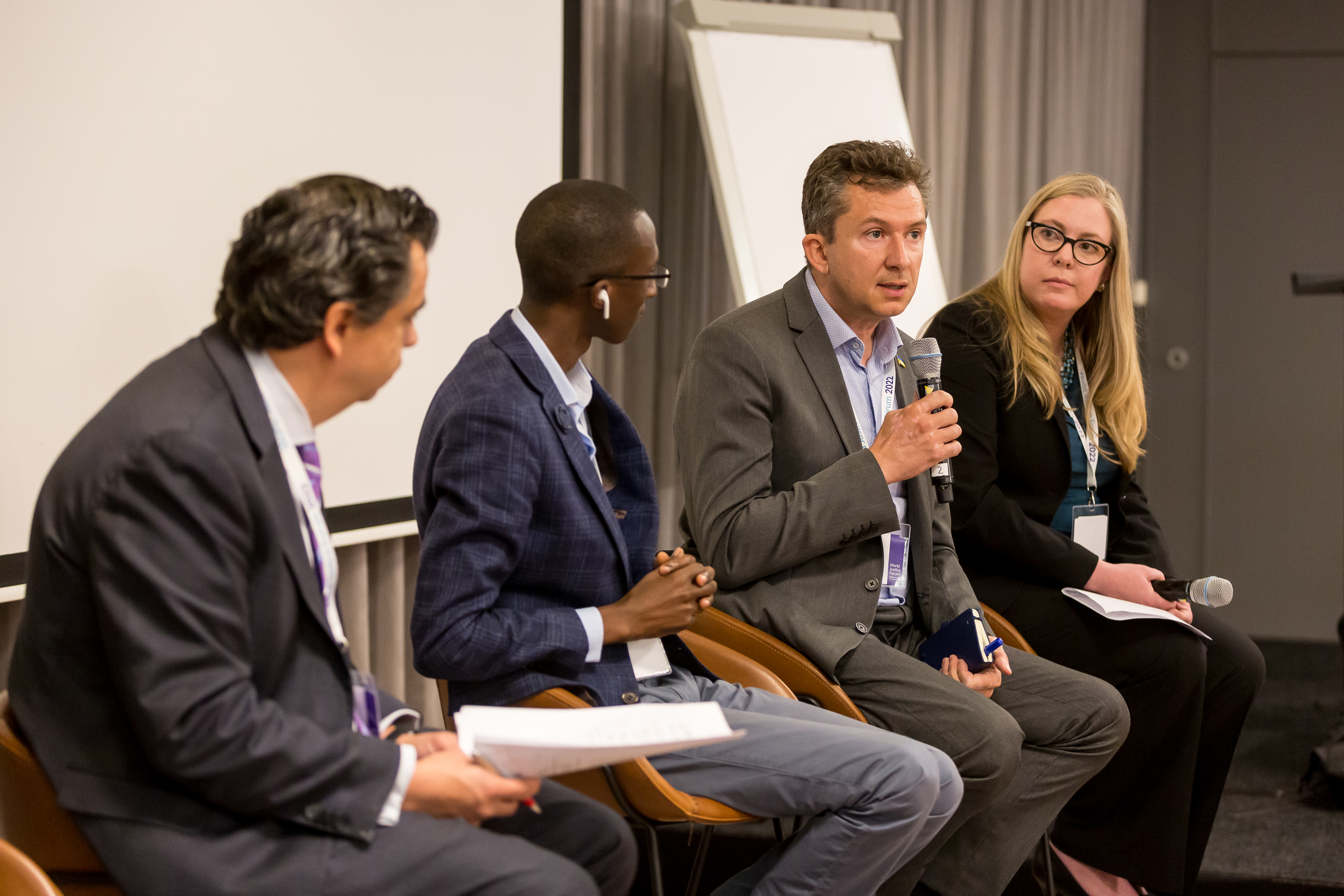

By Robert Litsky, Engagement Intern, World Justice Project
Approximately 5.1 billion people around the world lacked meaningful access to justice when the COVID-19 pandemic hit, according to a 2019 analysis by the World Justice Project (WJP). Access to justice is fundamentally linked to individual well-being: the 2019 study found that 40% of individuals who experienced a justice problem also faced health or financial hardship. A separate study WJP conducted in partnership with the OECD estimated legal problems cost nations up to 3% of their GDP. These serious justice problems tend to disproportionately affect women, children, people with disabilities, and other marginalized groups. The World Justice Forum 2022 highlighted the importance of adopting people-centered approaches to address these significant global justice gaps.
A diverse set of stakeholders met at the Forum to examine current access to justice trends, with a focus on the overarching goal of how to fulfill the “leave no one behind” principle set by the 2030 Agenda for Sustainable Development. Discussions touched upon how proactive government policies and actions, the integration of formal and informal justice systems, anti-discriminatory policies and attitudes, and people-centered data collection and policymaking can advance access to justice. The Forum also featured the World Justice Challenge prize competition, which spotlighted fourteen model access to justice initiatives from around the world.
Conversations at the Forum acknowledged how bias restricts access to justice. Such biases prevent marginalized groups from having a basic standard of living. During the “Access to Justice for Women with Intellectual and Psychosocial Disabilities in Asia and the Pacific” working session, panelists highlighted laws that take away women with disabilities’ legal capacity to initiate legal proceedings. Speakers throughout the Forum also cautioned that biases can seep into automated technology systems. For example, the Council of Europe’s Jan Kleijssen cited the recent Dutch childcare benefits scandal, where 1,600 children were separated from their families after an automated system reported fraud and denied benefits to low-income and minority people.
Recognizing that informal justice systems are rooted in tradition and culturally embedded, many Forum discussions focused on the important contribution informal justice systems can make to improve people’s experience with dispute resolution. Participants noted that governments can use local partnerships to harness the trust of informal justice systems to make justice more accessible. For example, Cleze Rore, the Minister of Justice and Legal Affairs in the Solomon Islands, detailed how disputes in the Pacific Island nation are generally first adjudicated by the informal justice system and only afterwards considered by the formal justice system. Minister Rore contended that the system fosters “peace and harmony.” In a separate working session, Ahmed Ali Adam, Director of the Somali Alternative Dispute Resolution Department, shared how in 2016 the Ministry of Justice integrated their formal justice system with the commonly used informal Xeer system to ensure Xeer proceedings are consistent with basic human rights standards.
Discussions about localized approaches to access justice also included how to collect people-centered data and empower communities. To create an environment conducive to justice innovation, participants broadly agreed that data collection must fit local contexts. In one plenary, Microsoft Vice President Steve Crown called for “radically local” data collection that includes marginalized communities in research and subsequent policies. Annete Mbogoh, Executive Director at Kenyan legal aid organization Kituo cha Seria, highlighted the value of this approach when discussing her organization’s work with local practitioners to design and carry out research. Partnering with local actors resulted in better targeted research questions, more accurate interpretations of data, and community ownership of justice initiatives.
Throughout the Forum, participants recognized the need for government action to achieve access to justice for all and lead meaningful rule of law reform. Lysa John, the Secretary General of CIVICUS, noted this when she called on European governments to more robustly fund civil society organizations in order to create and maintain the civic space necessary for political change. Further, during the “Identifying What Works” plenary, the Minister of Justice of Uzbekistan, Ruslanbek Kuroltayevich Davletov, detailed how Uzbekistan’s creation of new administrative courts and removal of procedural barriers to obtain government services led to greater access to justice in the Central Asian nation.
The World Justice Challenge spotlighted impactful, scalable, and sustainable rule of law solutions that embodied many of the people-centered justice approaches explored throughout the Forum. One challenge winner, the POS Foundation, introduced mobile, in-prison special courts to alleviate prison overcrowding in Ghana. The initiative has successfully reduced the remand prison population from 33% in 2007 to 12% in 2022. Another winner, Cambodia Bridges to Justice, addresses substantial gaps in access to justice by directly supporting defendants in high priority cases in the country’s appellate court system. The project has reduced prison overcrowding, decreased torture, and led to greater acceptance of legal aid in Cambodia.
The 2022 Forum concluded with a Final Statement that reflected on the constructive dialogue by key stakeholders from over 116 countries and 566 organizations. On access to justice, the statement identified the value of people-centered, collaborative approaches that utilize data, technology, and informal justice systems. The Forum also provided a platform for a number of tangible outcomes and commitments. This included the adoption of the Justice Action Coalition’s Justice Appeal 2023, which calls on all countries to pivot to people-centered justice to achieve the Sustainable Development Goals. Other initiatives launched at the Forum included: the Ibero-American Justice Alliance, a coalition of civil society organizations that will identify justice gaps and best practices in the region; the Hague Institute for Innovation of Law (HiiL)’s Innovating Justice Fund, which will invest in access to justice start-up initiatives; and UNDP’s Justice Futures CoLab, a new platform for justice practitioners to collaborate. Stakeholders left the World Justice Forum ready to enact people-centered, data-driven policies to achieve access to justice for all.






